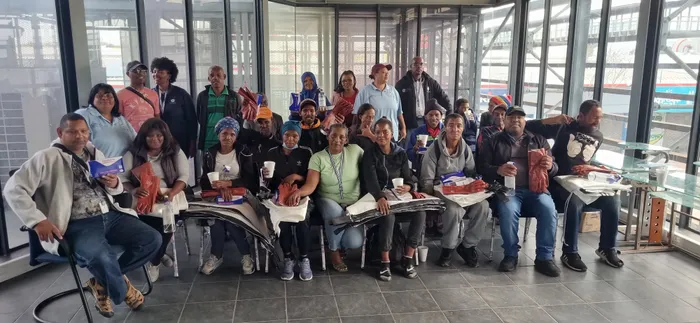Bin pickers equipped

Bin pickers receive equipment to be safe.

Local government is helping “bin scratchers” to form small recycling businesses to reduce illegal dumping, waste and unemployment.
About 35 people who wade through bins in Ward 116, including Beacon Valley and Eastridge, received hand sanitiser, durable gloves, one ton recycle bags and gloves to start off recycling projects by the department of community development directorate and Solomon Philander, councillor for Ward 116 and chairman of Wolfgat Subcouncil, on Tuesday April 12.
Regional coordinator Lynn Philips for the directorate’s metro 2, stretching from Mitchell’s Plain to Atlantis and also to Hout Bay, said they want these recyclers to organise into a cooperative.
She said the hand over was a small token to help with their safety.
“We want to look at a place to sift through waste, where to take it and develop entrepreneurial skills with people, who were often looking for their next fix but rather incentivise them differently,” she said.
Ms Philips said they would like to formalise this trade, where those scavenging through dirt can be employed and also employ others.
She said it was a way of restoring their dignity.
“Not to be relabelled but become proficient in what they started, to learn the various products and how it will assist in reducing climate change and a clean and green environment,” she said.
Ms Philips said that they would ensure participants are empowered with skills, receive entrepreneurial training and small business development.
The group mainly collected paper and plastic but when they are more organised, they could expand.
She said this project could help green the planet.
Mr Philander said the landfills would soon reach capacity
“Imagine we divert the recycling goods away from landfills. It means saving trees, reducing demand for landfill space and saving on electricity over time.
“Recycling means a greener society and will contribute positively to the environment,” he said.
Mr Philander said waste pickers were often stigmatised as drug users, street people or other negative labels.
“Our intervention is to bring dignity to the waste pickers and educate the community to think differently around waste,” he said.
Mr Philander said the other benefit for the community was to generate entrepreneurs and create employment opportunities in recycling.
“We will need everyone to work with this project to reduce waste to landfill,” he said.
He is hopeful that the start of these programmes would reduce illegal dumping costing the City of Cape Town millions of rands to be cleared, which could instead be used for other development in Mitchell’s Plain.
The project provides support to the local waste pickers to formalise collection; establishes a local action committee in Ward 116 to roll out a practical operation, by selecting two representatives from the waste pickers; explores possible support from private and public sectors to make the project sustainable; and improves education on how the community can support the recycling project.
Residential refuse is collected weekly and there are two free drop off sites in Mitchell’s Plain - Strandfontein and Swartklip.
“We continue to see the increase of illegal dumping in our area. Property owners have the option to apply for an additional bin, a tariff linked service but despite all this we have dumping on public open spaces,” he said.
For more information call Mr Philander on 083 690 7772 or email solomon.philander@capetown.gov.za